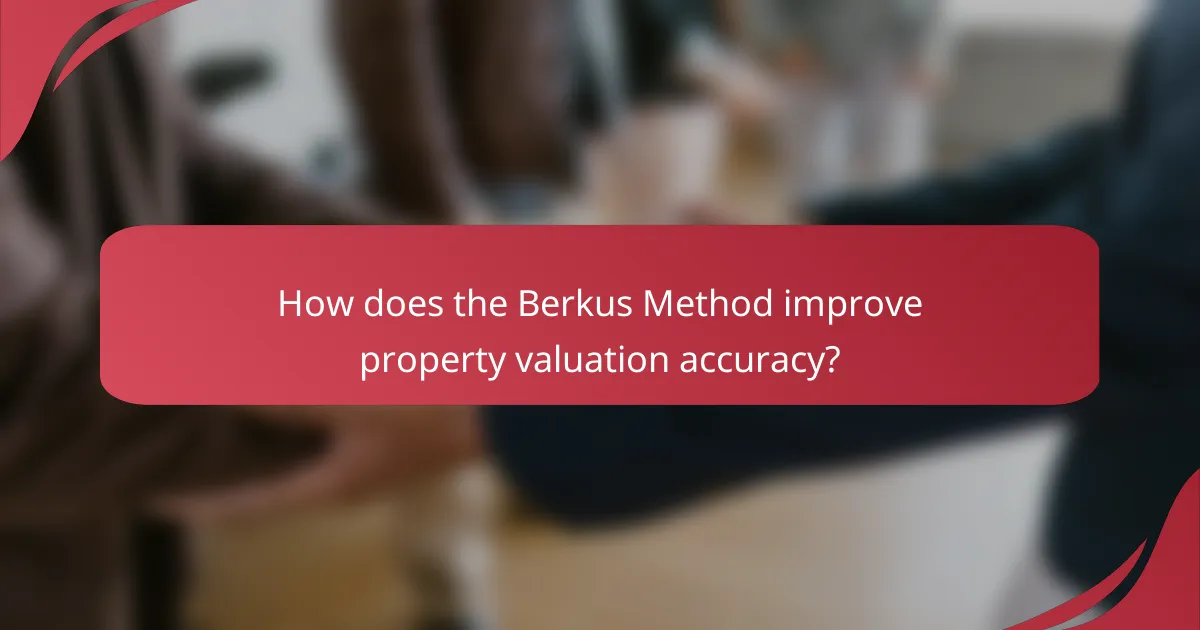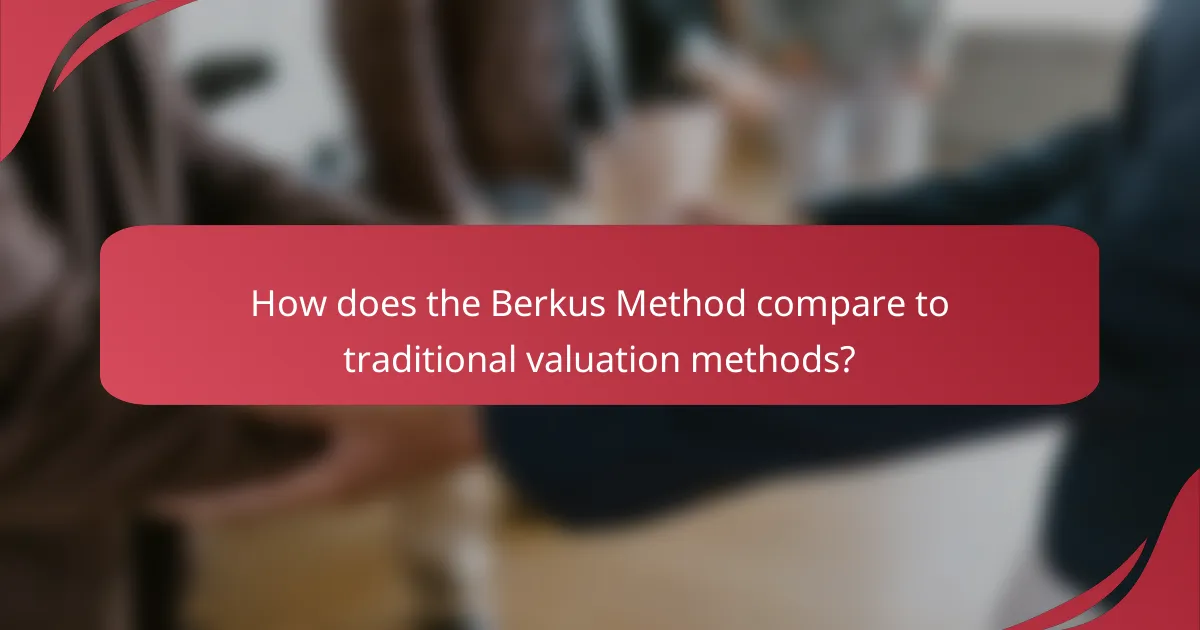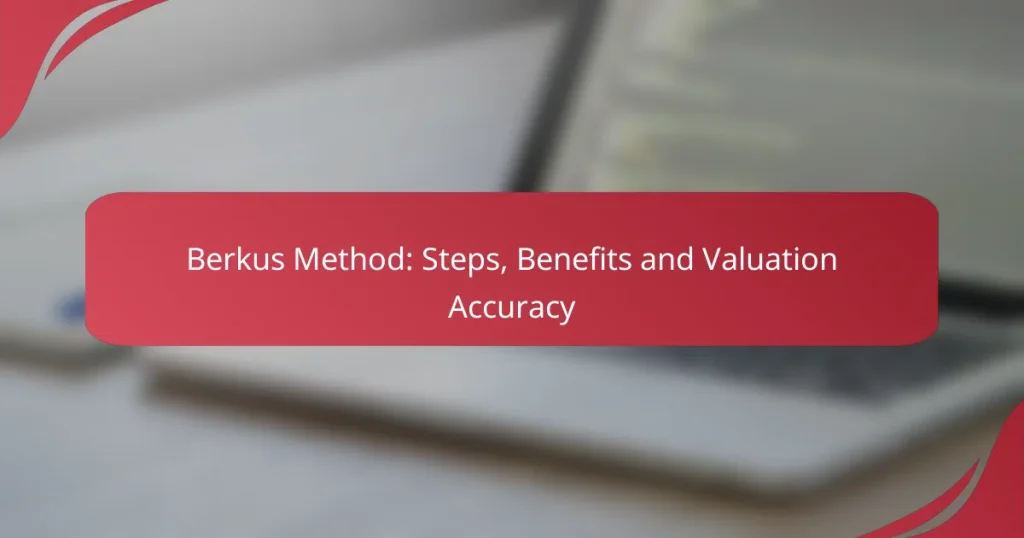The Berkus Method is a valuation approach designed for early-stage startups, emphasizing qualitative factors that influence a property’s or business’s worth. By focusing on various risks and potential value drivers, this method enhances valuation accuracy, especially in markets lacking reliable comparable sales. It provides a clear framework that simplifies the valuation process, benefiting both entrepreneurs and investors by fostering informed decision-making and building trust.

How does the Berkus Method improve property valuation accuracy?
The Berkus Method enhances property valuation accuracy by focusing on qualitative factors that contribute to a property’s value, rather than solely relying on quantitative data. This approach allows for a more nuanced assessment, particularly in markets where comparable sales are limited or not reflective of a property’s true potential.
Focus on key value drivers
The Berkus Method emphasizes specific value drivers that significantly impact a property’s worth, such as location, market demand, and property condition. By identifying these key factors, appraisers can assign appropriate values to each driver, leading to a more accurate overall valuation.
For instance, a property in a rapidly developing area may receive a higher value due to anticipated future demand. This focus helps ensure that the valuation reflects the unique characteristics of the property rather than relying solely on historical sales data.
Reduces reliance on comparable sales
This method minimizes the dependency on comparable sales, which can be problematic in volatile or niche markets. Instead of trying to find similar properties that may not exist, the Berkus Method allows appraisers to evaluate properties based on their intrinsic value and potential.
In practice, this means that even if there are few recent sales of similar properties, appraisers can still arrive at a reasonable valuation by considering the unique aspects of the property and its market environment.
Incorporates subjective factors
The Berkus Method integrates subjective factors that traditional valuation methods often overlook. Elements such as the property’s aesthetic appeal, potential for future renovations, and the owner’s motivation can all influence value but are difficult to quantify.
By acknowledging these subjective elements, appraisers can provide a more comprehensive valuation. For example, a property with unique architectural features may be valued higher due to its appeal to specific buyer demographics, even if comparable sales suggest otherwise.

What are the steps in the Berkus Method?
The Berkus Method is a valuation approach for early-stage startups that focuses on assessing various risks and potential value drivers. It consists of several key steps that help investors determine a startup’s worth based on qualitative factors rather than just financial metrics.
Step 1: Assess the basic value
The first step involves evaluating the startup’s basic value, which typically starts at a baseline amount. This baseline can range from $500,000 to $1 million, depending on the industry and market conditions.
Consider factors such as the founding team’s experience, the business model, and initial traction. A strong team with relevant experience can significantly enhance the perceived basic value.
Step 2: Evaluate technology risk
In this step, assess the technology risk associated with the startup’s product or service. This includes evaluating the feasibility of the technology and the likelihood of successful development.
For instance, if the startup relies on unproven technology, this could increase the risk and lower the valuation. Conversely, if the technology is already validated through prototypes or early customer feedback, it can positively impact the valuation.
Step 3: Analyze execution risk
Execution risk pertains to the startup’s ability to effectively implement its business plan. This includes evaluating operational capabilities, market entry strategies, and the team’s ability to execute on their vision.
Investors should look for clear milestones and a realistic timeline for achieving them. A well-defined roadmap can mitigate execution risk and enhance the startup’s valuation.
Step 4: Consider market risk
The final step involves analyzing market risk, which includes understanding the competitive landscape and market demand for the startup’s offering. This assessment helps determine how well the startup can perform in its target market.
Factors such as market size, growth potential, and competitive advantages should be evaluated. A startup positioned in a growing market with minimal competition may command a higher valuation compared to one in a saturated market.

What are the benefits of using the Berkus Method?
The Berkus Method offers several advantages for valuing early-stage startups, primarily by providing a clear framework that simplifies the valuation process. This method helps entrepreneurs and investors understand the key components that contribute to a startup’s worth, enhancing decision-making and fostering investor trust.
Provides a structured valuation approach
The Berkus Method uses a systematic approach to assess a startup’s value based on five key criteria: sound idea, prototype, quality management team, strategic relationships, and product rollout. Each criterion is assigned a specific monetary value, typically ranging from low tens of thousands to several hundred thousand dollars, depending on the startup’s stage and potential.
This structured method allows for a more consistent evaluation across different startups, making it easier for investors to compare opportunities. By breaking down the valuation into distinct components, entrepreneurs can identify strengths and weaknesses in their business model.
Enhances investor confidence
By employing the Berkus Method, startups can present a well-defined valuation that resonates with investors. This clarity reduces ambiguity, allowing investors to make informed decisions based on tangible criteria rather than vague projections. When investors see a structured approach, they are more likely to trust the startup’s potential for success.
Moreover, the method emphasizes the importance of a strong management team and strategic relationships, which are critical factors for investor confidence. Highlighting these aspects can significantly improve a startup’s appeal to potential backers.
Facilitates better decision-making
The Berkus Method aids entrepreneurs in making strategic decisions by clarifying which areas of their business need improvement. By evaluating each of the five criteria, founders can prioritize their efforts on aspects that will enhance their startup’s valuation, such as developing a prototype or strengthening their management team.
This focus on measurable factors allows for more effective resource allocation, ensuring that time and capital are invested in the most impactful areas. Additionally, understanding the valuation framework can help entrepreneurs set realistic goals and expectations for future funding rounds.

How does the Berkus Method compare to traditional valuation methods?
The Berkus Method offers a streamlined approach to valuing early-stage startups, contrasting with traditional methods that often rely on extensive financial data. While traditional valuations may focus on revenue and profit metrics, the Berkus Method emphasizes qualitative factors that are crucial for nascent businesses.
Focus on startups vs. established businesses
The Berkus Method is specifically designed for startups, addressing their unique challenges and uncertainties. It evaluates factors such as the idea, prototype, and market potential rather than historical financial performance, which is more relevant for established businesses.
In contrast, traditional valuation methods, like discounted cash flow (DCF) or comparable company analysis, are better suited for established firms with predictable revenue streams. Startups often lack this data, making the Berkus Method a practical alternative.
Subjective vs. objective valuation criteria
Valuations using the Berkus Method are inherently more subjective, relying on qualitative assessments of various factors like the management team and market conditions. This contrasts with traditional methods, which typically use objective financial metrics and historical data.
While subjectivity can introduce variability, it allows for a more nuanced understanding of a startup’s potential. Investors should be aware of this trade-off and consider how subjective factors align with their investment strategies.
Speed of valuation process
The Berkus Method is generally faster than traditional valuation approaches, allowing investors to make quicker decisions. Startups often need rapid funding, and the Berkus Method’s focus on qualitative factors can expedite the evaluation process.
In traditional valuations, gathering and analyzing financial data can take significant time, often stretching into weeks or months. For startups seeking immediate investment, the Berkus Method provides a more efficient pathway to valuation.

What are the prerequisites for applying the Berkus Method?
To effectively apply the Berkus Method, a solid understanding of startup dynamics and access to relevant market data are essential. These prerequisites ensure that the valuation process is grounded in realistic assessments of the startup’s potential and market conditions.
Understanding of startup dynamics
Grasping startup dynamics involves recognizing the unique challenges and opportunities that new ventures face. This includes factors such as product development stages, customer acquisition strategies, and competitive landscape. Familiarity with these elements allows for a more accurate assessment of a startup’s value.
For instance, understanding the typical lifecycle of a startup can help in evaluating its progress and potential. A startup in the early stages may have different valuation metrics compared to one that is scaling rapidly. Recognizing these differences is crucial for applying the Berkus Method effectively.
Access to relevant market data
Having access to relevant market data is vital for making informed decisions when using the Berkus Method. This data can include industry benchmarks, competitor analysis, and market trends. Such information helps in contextualizing the startup’s performance and potential within its specific market.
For example, if a startup operates in a rapidly growing sector, this can significantly influence its valuation. Utilizing market data to compare similar startups can provide insights into reasonable valuation ranges, helping to avoid overestimations or underestimations. Regularly updating this data is also important to reflect current market conditions accurately.


